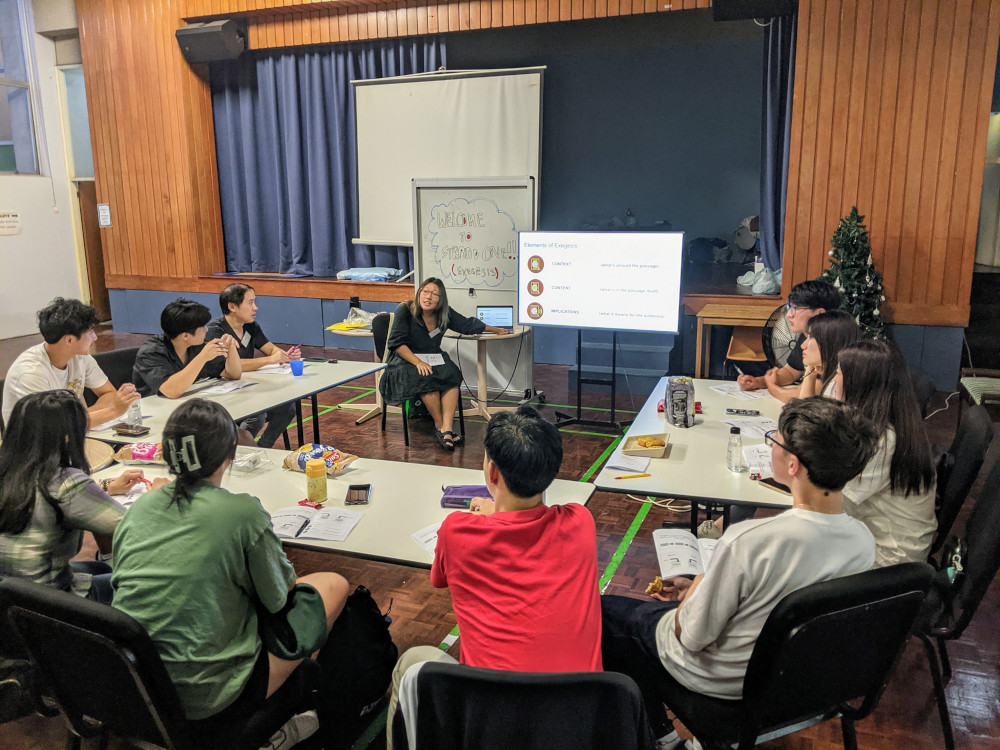“High quality training that is free of cost” is the promise of the Understanding Scripture courses produced by young evangelical theological graduates, and tested at the recent Catalyst Bible conference in south west Sydney. A set of three courses are online at the inviting URL training.freely.giving They cover exegesis (understanding the text of the Bible), Biblical theology (studying the story of how “God has progressively revealed himself through teachings and actions over thousands of years through the story of the Bible,”) and Systematic Theology (studying what the Bible says by topics).
The courses are free of charge, free of copyright and free to modify.
The Other Cheek asked John Here, the lead writer of the courses about why Understanding Scripture is online for free.
What is it?
Understanding Scripture is a set of three trainings in the basics of exegesis, biblical theology, and systematic theology. It’s similar to “strands” that are used by a number of conferences in Sydney in terms of being designed for group work on those three topics. But I take a fairly different approach to the format of the content to make it easier to adapt to other use cases.
Who is it aimed at?
In terms of who will learn from it, it’s aimed at everyday believers and doesn’t assume a certain level of education.
But more importantly, it’s aimed at pastors and missionaries, to assist them in teaching these skills to others. Having served as both a pastor and missionary, I know what I want to do with material like this. I want to modify and adapt it. Not necessarily because it can be improved (it can be), but because I want to suit it to my audience, or teach it in the way I prefer. I might want to condense it, add something, reword something, etc. Because it’s free of copyright there is complete freedom to do this.
This is especially important for missionaries, as I have no idea what the cultures are like where they work. They need the freedom to contextualise it in ways I couldn’t possibly anticipate.
Doesn’t that mean someone can corrupt it?
If your church is like mine, we let anyone in the door, we don’t vet them. Even though someone could potentially ruin the service. They might heckle the pastor, steal audio equipment, or tear up the bibles in the pews. All of those things can happen and I’m sure do happen on rare occasions. So why don’t we vet people? Because the risk is minimal and it is far more important to not impede anyone entering church than worrying about something like that.
I likewise don’t want someone to have to wait for my reply to get permission to change something. And to be honest, I really don’t have the time to review anything. I’ve actually already witnessed someone asking about access to strand material in a forum. When someone brought up copyright in the comments, they didn’t want to get into the whole ‘asking permission’ thing, so they just came up with something else. This is the norm, not the exception, in my experience.
How well did it go over at Catalyst conference in Sydney?
Catalyst used material written by several pastors including strands for Evangelism and Preaching. It was well received and we got helpful feedback. I used that feedback to revise the material now included in Understanding Scripture.
The conference was free this year and we ended up receiving a similar amount of funding through donations compared to when we charged a fee last year. Not that it mattered though. It’s not about strategy but about giving without expecting anything in return, and trusting God to provide. Just like we do every Sunday at church.
How many hours went into Understanding Scripture?
I wrote it all over the span of four months, with several weeks of work put into it. Several leaders provided feedback, especially those who used it for strands 1 & 2 at Catalyst.
I wanted to ensure it was 100% free of copyright so there would be no barriers to other people translating and adapting it. Which meant all the content, including the branding and diagrams had to be original (in a legal sense, I am indebted to all the leaders who have taught me what I know).
So it ended up being a lot of work, but it was nice to not be bound by any conditions while doing it.
How has your resolve to do it for free held up?
I’ve completed several large projects, mostly software, and I usually experience something I like to call “pre-launch anxiety”. Where I’ve put a ton of work into something, it is entirely my own, and I start to imagine all the ways someone might exploit my hard work for their own benefit. So I would get very anxious a few weeks ahead of launch and think through how to prevent anything from being abused.
I don’t feel that any more. Mostly thanks to my theological convictions, but I’ve also realised such fears are simply irrational. I know abuses do happen, and will probably happen to my own work at some point. But worrying about that is foolish and copyright only prevents people with good consciences adapting material (since they’ll obey the law) and not actual bad people (who will be willing to abuse copyright anyway).
Copyright is automatic but only takes 1 minute to relinquish, and I highly recommend everyone in ministry gets into the habit of dedicating everything they create to the public domain.
Image: Studying the exegesis strand at the Catalyst conference Credit: catalyst FB

